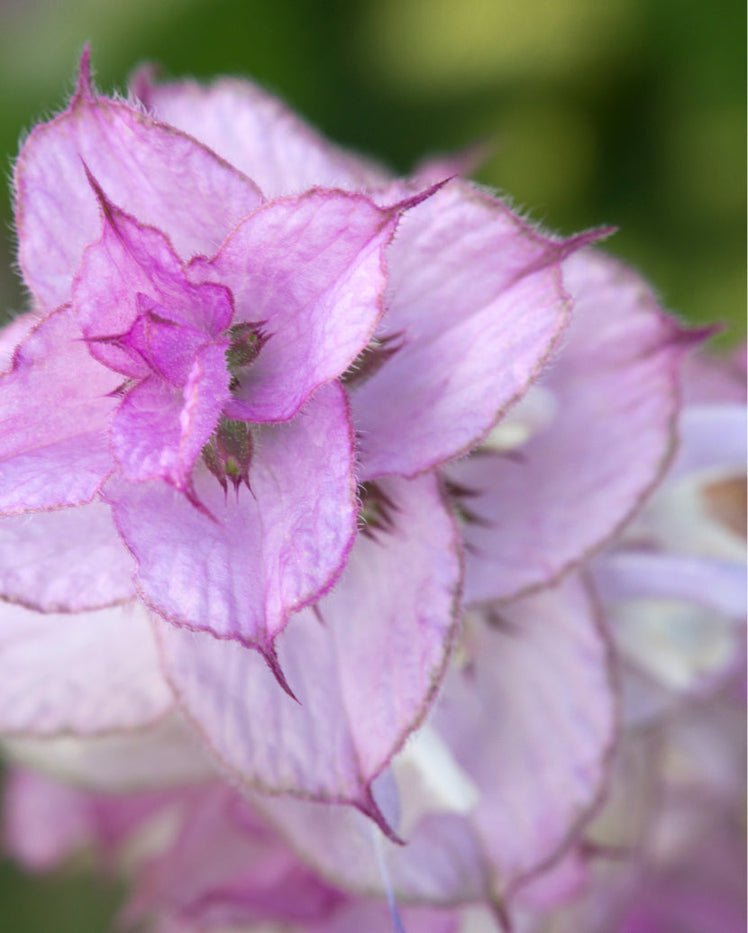About the Oil
Steam-distilled from the flowering tops of the Salvia sclarea plant, clary sage essential oil offers an herbaceous, slightly floral, and musky aroma prized for its grounding and emotionally harmonizing effects. Known for centuries as a botanical ally for women’s wellness and nervous system balance, it remains a go-to oil for easing discomfort, reducing stress, and supporting hormonal health.
Its key constituents—linalyl acetate, linalool, and sclareol—lend the oil its calming, antispasmodic, and gently euphoric properties.
Why You Would Use Clary Sage Essential Oil
- Traditionally used to support hormonal balance, especially during menstruation or menopause
- To ease abdominal tension and cramping
- To soothe stress, overwhelm, or emotional volatility
- For its mild euphoric, mood-lifting effects
- As a natural antimicrobial and antioxidant agent for environmental or skin support
Clinical Findings
| Study | Participants & Methods | Key Results | Reference |
|
Menstrual relief |
48 women received aromatherapy massage with clary sage, lavender, and marjoram |
Significant reduction in menstrual cramps and abdominal pain compared to placebo |
Hur et al., 2012 |
|
Dysmenorrhea |
In vtro and ex vivo |
Scalerol is a potential natural product that can treat primary dysmenorrhea. |
Wong et al,. 2020 |
|
Antifungicidal |
In vitro |
A concentration of 25 µl/ml showed fungicidal activity against Aspergillus, Penicillium, and Fusarium species and Trichoderma viride. |
Džamic et al., 2008 |
|
Antibacterial activity |
In vitro testing against resistant bacteria |
Enhanced antibiotic efficacy and direct antimicrobial action |
Chovanová et al., 2013 |
Behind The Science
Clary sage works through multiple pathways. Its dominant ester, linalyl acetate, has calming, antispasmodic effects, while linalool supports mood and nervous system modulation. Together, they help relax smooth muscle tissue and calm overactive nerves.
The presence of sclareol, a phytoestrogenic compound, is thought to contribute to the oil’s hormone-balancing properties—especially in cases of estrogen deficiency. Clary sage also supports the body’s parasympathetic response, helping ease tension and return the body to a state of calm and rest.
How and Where It Grows
Clary sage grows best in temperate Mediterranean climates, thriving in France, Bulgaria, and parts of Central Europe. A biennial herb, it produces tall flowering stalks in its second year. Its flowering tops are harvested at peak bloom and steam-distilled to yield an oil rich in volatile esters.
Use in Ancient Medicine
Clary sage has been used since ancient times as a clarity tonic—both for eyesight and insight. In medieval Europe, it was applied for digestive and uterine complaints and even used in sacred rituals to invoke calm and wisdom. Known as "clear eye" in early texts, it was revered as a spiritual and emotional support botanical.
Symbolism
Clary sage represents clarity, intuition, and inner knowing. Its calming aroma helps dispel confusion, restore balance, and invite emotional resilience. It is considered an oil of vision—supporting not just mental clarity, but also heart-aligned decision-making.
INFORMATION provided is intended for informational purposes only and is not meant to diagnose, treat, cure, or prevent any disease. Statements have not been evaluated by Health Canada or the FDA. Please consult a qualified healthcare provider before using essential oils for therapeutic purposes.
References
- Wong, J., Chiang, Y. F., Shih, Y. H., Chiu, C. H., Chen, H. Y., Shieh, T. M., Wang, K. L., Huang, T. C., Hong, Y. H., & Hsia, S. M. (2020). Salvia sclarea L. Essential Oil Extract and Its Antioxidative Phytochemical Sclareol Inhibit Oxytocin-Induced Uterine Hypercontraction Dysmenorrhea Model by Inhibiting the Ca2+-MLCK-MLC20 Signaling Cascade: An Ex Vivo and In Vivo Study. Antioxidants (Basel, Switzerland), 9(10), 991. https://doi.org/10.3390/antiox9100991
- Hur, M. H., Lee, M. S., Seong, K. Y., & Lee, M. K. (2012). Aromatherapy massage on the abdomen for alleviating menstrual pain in high school girls: a preliminary controlled clinical study. Evidence-based complementary and alternative medicine : eCAM, 2012, 187163. https://doi.org/10.1155/2012/187163
- Chovanová, R., et al. (2013). Resistance-modifying and antibacterial activity of clary sage essential oil. International Journal of Microbiology.
- Cui, H., Zhang, X., Zhou, H., et al. (2015). Antimicrobial activity and mechanisms of Salvia sclarea essential oil. Botanical Studies, 56, 1-8. http://doi.org/10.1186/s40529-015-0096-4
- Džamić, A., Soković, M., Ristić, M., et al. (2008). Chemical composition and antifungal activity of Salvia sclarea (Lamiaceae) essential oil. Archives of Biological Sciences, 60(2), 233-237. http://doi.org/10.2298/ABS0802233D

